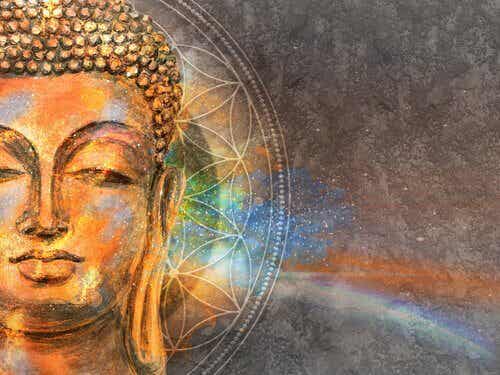
Last update: 13 September, 2020
Love according to Buddhism it totally differs from the concept of Western love. In the first context, love is defined as a pure feeling that gives itself to another living being in a disinterested way. It leads to absolute well-being knowing that you have not caused pain and suffering, but that you have helped generate energy in the other person.
In the West, love is an ambivalent concept that requires the presence of the other person, reciprocity and belonging. It can be considered ambivalent because if on the one hand it requires the satisfaction of the partner's desire, on the other hand it focuses on the ego. In other words, it is a less selfless feeling than love according to Buddhism.
We find ourselves in the presence of two opposite concepts in that, according to the words of Sigmund Freud, although the object of love seeks the protection of the other, there is an intention to preserve it as one's own and it can also become a source of offense and insult when separated from itself.
This happens because the life and death drives make use of a dialectical relationship. Love cannot be conceived separately from hate. More precisely, according to psychoanalytic theory, the life drive, which aims to unite and preserve, is linked to the death drive, which wants to destroy and separate. They feed each other.
Let's see in more detail what it means to love according to Buddhism.
Love according to Buddhism: the main characteristics
Loving according to Buddhism has nothing to do with the conception established in the West. One of the main characteristics of love according to Buddhism is in fact the ability to feel compassion for the other. In this sense, all living things should be respected.
The Buddhist conception also states that the intention that drives love must be the same that nourishes faith, that is, it must aim to enlighten, eliminating the suffering that instead characterizes Western love. It is a genuine desire to do good for the other, sharing energy and resources.
“There are many ways to increase positive energy, but the most powerful of all is to generate love and faith, born from the energy of original wisdom. If we connect through faith with the vast and profound continuity of the mind, then the inner, graceful and luminous qualities of the energy of wisdom will emerge. The essence of love is the compassion of sublime beings capable of transmitting energy. "
-Thinley Norbu-
Kindness and benevolence as significant parts of love
To love according to Buddhism means to be kind and benevolent, but without attaching oneself to the other person, a tendency that in retrospect causes suffering. To practice love according to Buddhist philosophy, it is not necessary to cling to anything, since nothing is static, everything changes and transforms itself.
The doctrine promises that happiness and fullness reside exclusively within oneself, and from there they must start in order to be shared. However, there is no total sharing: addiction does not belong to this philosophy.
Love according to Buddhism is interminable, since the energy it feeds on belongs to the universe and not to the individual himself. When love does not possess the characteristics mentioned above, according to Buddhism one is faced with a selfish projection of one's needs.
“The teachings on love given by Buddha are clear, scientific and applicable. Love, compassion, cheerfulness and equanimity are the very nature of an enlightened person. These are the four aspects of love within ourselves and within everyone and everything. "
-Thich Nhat Hanh-
Knowing how to truly rejoice for the other, without any kind of resentment, is another of the characteristics that define true love. Finally, this will need to be balanced and measured, so as not to upset the soul and turn into addiction.
Understanding true love for another human being from the Eastern point of view can prove to be a difficult task due to the different cultural background received and naturalized. However, trying to put it into practice is an excellent method to exploit all the abilities inherent in our soul.


























